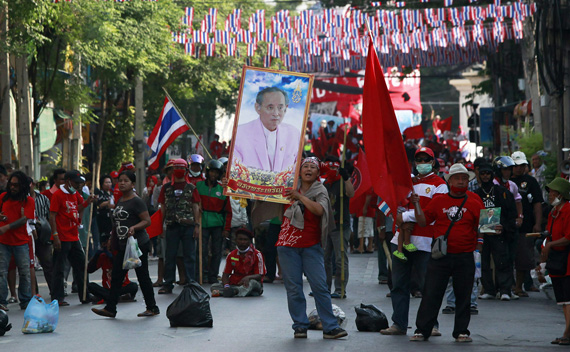The Dangerous Use of the Thai Monarchy
More on:

In the Asia Sentinel this week, Thai academic Pavin Chachavalpongpun has written a fascinating article entitled “Anti-Monarchy Sentiment Grows in Thailand.” In it, he outlines how several leaders of the red shirt protest movement believe that as many as ninety percent of their followers now may be anti-monarchists. This number seems a bit unrealistic to me. From my own conversations with red shirt leaders and supporters, I still think the majority of them respect the current king, Bhumibhol Adulyadej, though they (like most Thais) have grave concerns about his successor and about the influence of the conservative Queen Sirikit after the passing of the king, who is now essentially living in long-term care.
But as Pavin notes, there is likely growing anti-monarchical sentiment in Thailand because of the politicization of the crown, and this sentiment creates a perverse cycle. In the name of protecting the monarchy, the government and the military – which now increasingly dominates the government – have unleashed a vast and often ridiculous campaign against any speech that could be construed as the slightest critique of the crown. They have done so even though the king himself has said that he should not be above criticism and even though in previous decades the palace was hardly as protected from criticism. Thailand now bans over 100,000 websites, many for allegedly insulting the palace, though the definition of an insult or critique is so broad as to be useless. There is still virtually no definition of exactly what constitutes criticizing the crown, as Pavin notes. And there probably will never be, since the broad nature of lèse majesté laws makes it easier to arrest people.
Even some senior government officials privately realize that this witch hunt has gotten out of hand and threatens to badly tarnish Thailand’s reputation. Prime Minister Abhisit Vejjajiva often does not seem to even be in control of anti-monarch crackdowns. Speaking at our offices in New York earlier this year, the prime minister talked of Thailand’s commitment to media freedom, but later he seemed taken unaware that the authorities had arrested one of the Thai media’s most prominent online editors on a thin charge of critiquing the crown.
But the cycle is operating, running out of control. Because of the politicization of the crown and the crackdown, average people become somewhat more anti-palace. The government can then use this as an excuse to crack down further, arguing (as it once did with communism) that there are anti-monarch elements hiding throughout Thai society that need to be ferreted out. This further crackdown then inflames average people more, and potentially makes anti-monarch sentiment worse. And so on. Perhaps the only person who could stop this cycle is the king himself. But given that he essentially put himself out for criticism in the past and still the Thai government refused to allow any discussion of the palace, he is not likely to try again.
More on:
 Online Store
Online Store
